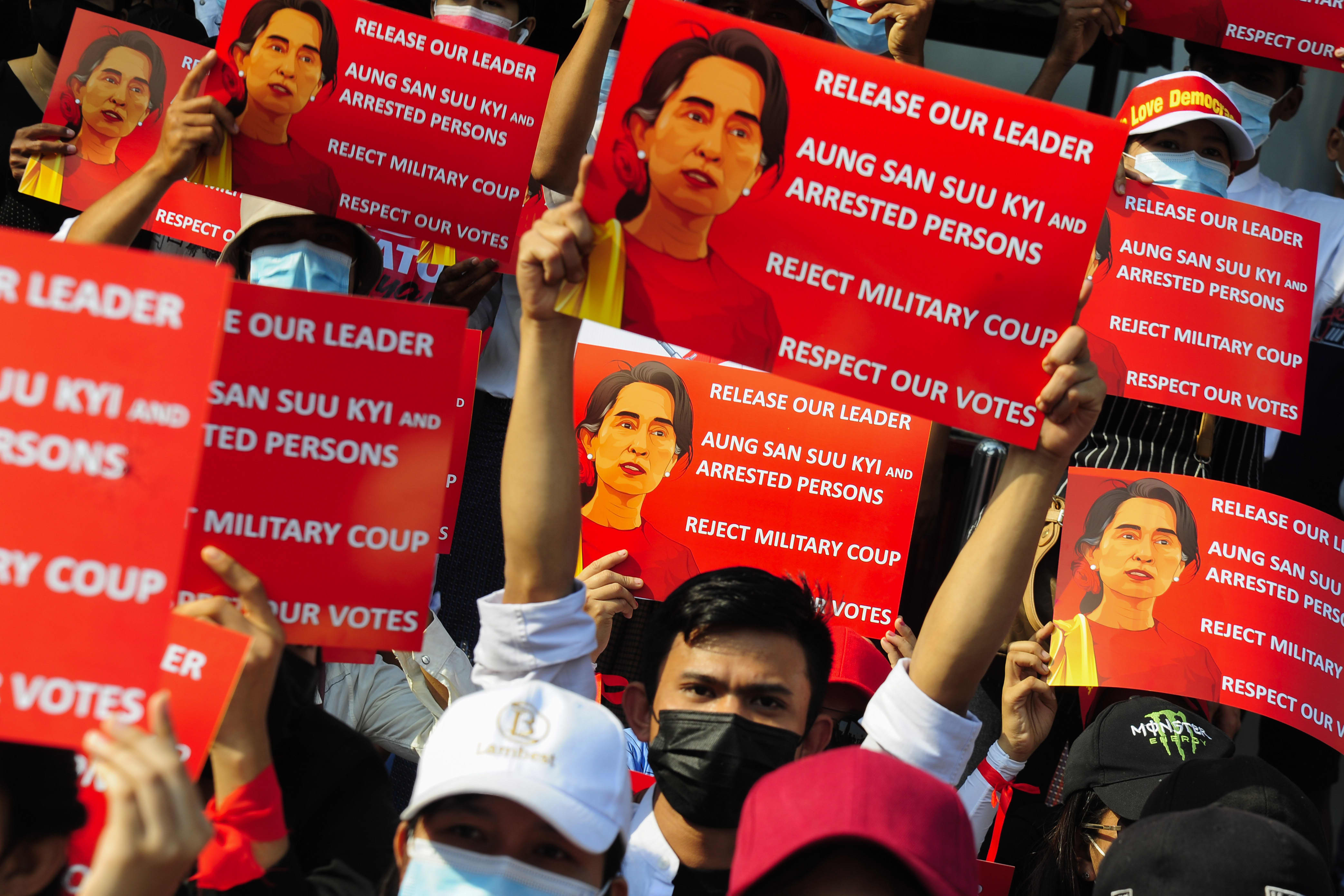
Anti-coup protesters hold placards as they protest against the military coup Saturday, February 20, 2021, in Yangon, Myanmar.
Anadolu Agency | Getty Images
China’s “laissez-faire” approach toward Myanmar’s military coup could hurt the Asian giant’s strategic and economic interests in the Southeast Asian country, said a political risk analyst.
In contrast to strong condemnation and sanctions by Western powers — including the U.S. and the European Union — China’s response to the Feb. 1 coup and the violence that followed has been more muted. Beijing has been cautious and is emphasizing the importance of stability.
“But while China may be happy to deal with whoever wields power in Naypyidaw, it is increasingly clear the chain of events the coup unleashed could threaten its interests,” Gareth Price, senior research fellow at the Asia-Pacific program of British think tank Chatham House, said in a March note.
Naypyidaw is the capital city of Myanmar and one of the hotspots for anti-coup protests. Security forces have used increasingly violent tactics to suppress the demonstrations, killing more than 550 civilians, reported Reuters.
If the military is forced to back down, it may result in a more pronounced anti-China tilt, threatening (China’s) strategic interests.
Gareth Price
senior research fellow, Chatham House
Demonstrators, outraged over Beijing’s apparent lack of concern for those killed in protests, attacked Chinese-run factories in Myanmar last month, the Associated Press reported. In response, Beijing urged Myanmar to “ensure the safety of life and property of Chinese businesses and personnel” there.
“China’s frustration with the risks facing its economic interests indicates that the coup has become a major test for the already complex Myanmar-China relationship,” Kaho Yu, senior Asia analyst at risk consultancy Verisk Maplecroft, said in a March report.
Myanmar-China relations
China is a major investor in Myanmar, a frontier Southeast Asian country which shares one of its borders. Myanmar is also an important part of President Xi Jinping’s signature Belt and Road Initiative.
“In general, Beijing expects investment in Myanmar to contribute to its energy security, trade and stability in its neighbourhood,” said Yu.
“China maintains that an economic slowdown in its neighbourhood would result in social instability and security threats, which would in turn threaten the political stability of Chinese border provinces such as Yunnan,” the analyst added.
The latest available data by Myanmar’s Directorate of Investment and Company Administration showed that approved foreign investments from China were around $139.4 million from October 2020 to January this year. Myanmar’s financial year starts in October.
The approved Chinese investments were exceeded only by Singapore’s, which totaled around $378.3 million in the same period, the data showed.
In terms of trade, China is the top destination for Myanmar’s exports and the largest source of imports into the Southeast Asian country.
But Myanmar’s importance to China extends beyond economics, said Price of Chatham House.
“The oil and gas pipelines running through Myanmar diversify China’s sources of supply and helps avoid using the Malacca Straits, a hotspot for piracy,” he said. “And the development of ports and overland connectivity between China and Myanmar also help facilitate a greater Chinese presence in the Indian Ocean.”
China could help end the coup
Beijing has in the past cultivated cordial ties with both the Myanmar military, as well as the civilian government of de facto leader Aung San Suu Kyi, Yu pointed out. In recent years, international pressure on Myanmar due to the Rohingya crisis has pushed the country closer to China, he added.
China’s top diplomat State Councilor Wang Yi reportedly said last month that “no matter how the situation in Myanmar changes, China’s determination to promote China-Myanmar relations will not waver.”
But any feeling on China’s part that it will continue to be Myanmar’s major partner regardless of who’s in charge may be a “misjudgement,” said Price.
“If the military is forced to back down, it may result in a more pronounced anti-China tilt, threatening (China’s) strategic interests,” he said.
Instead, Beijing could help end the coup — a move that might threaten its interests in Myanmar in the short term, but will likely advance them in the longer term, Price said. Myanmar’s generals have no intention of ceding power but will struggle to hold on to it without China’s support, he said.
“As its global role expands, China should be learning to differentiate between various types of authoritarian government and judge its response accordingly,” said Price.
“China needs to be aware that a ‘one size fits all’ policy of non-interference will not win many friends, and any it does win are likely to be of the less salubrious kind.”




